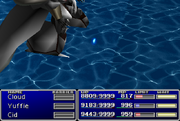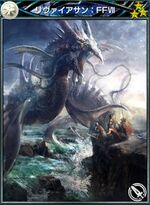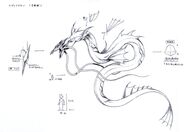![]() Leviathan is a Summon Materia in Final Fantasy VII. It summons Leviathan, who performs Tidal Wave, a Water-elemental attack that deals major damage to all enemies.
Leviathan is a Summon Materia in Final Fantasy VII. It summons Leviathan, who performs Tidal Wave, a Water-elemental attack that deals major damage to all enemies.
The Leviathan Materia has the Water element, which can be linked with the Support Materia Elemental. It is one of the few ways to deal Water damage.
Obtaining Leviathan in the PlayStation 4 version earns the Making Waves trophy.
Leviathan was one of the summons to also appear in the original 1996 Aeris demo release where, for a cost of only 40 MP, Aeris could summon Leviathan into battle to use his Tsunami attack, the original name for Tidal Wave.
Obtained[]
The Leviathan Materia is obtained in Wutai Village from Yuffie's sidequest, "Homecoming of a Miserable Daughter". She wins it after defeating the fifth and last pagoda god.
Stats[]
Growth[]
- See the Summon sequence here.
| Level | AP required |
|---|---|
| 1 | 0 |
| 2 | 18000 |
| 3 | 38000 |
| 4 | 87000 |
| 4 | 100000 |
Ability[]
| Ability | MP cost | Power | Effect |
|---|---|---|---|
| Tidal Wave | 78 | 75 | Water-elemental damage to all enemies. |
Use[]

Tidal Wave.
Summoning Leviathan costs 78 MP, and causes him to perform Tidal Wave. Tidal Wave deals major Water-elemental damage to all enemies at 4.6875x the base magic damage, which cannot be reflected. It is one of the more powerful summons, and one of the few ways to deal Water damage.
Leviathan deals a large amount of Water-elemental damage. Its main drawbacks are that it has a high MP cost, and that it is wasted against enemies resisting Water. Leviathan is useful in many cases against powerful enemies or groups. Later summons outclass Leviathan in pure damage, but also have greater MP costs, and even larger stat changes. It also remains useful against enemies weak to Water.
The Leviathan Materia can be paired with the Elemental Materia on weapon to deal Water-elemental damage with physical attacks, or with armor to resist, nullify, or absorb Water damage. However, the Materia comes with fairly significant stat changes of -5% HP, but +5% MP, +1 Magic, and +1 Magic def. Though this is a drawback for characters geared towards physical damage, as the HP is detrimental and the stat boosts are not useful, it has no penalty to Strength. This means it can still be useful when given to Cloud, Barret, Tifa, and Cid, allowing them to exploit enemies' weaknesses to Water and deal more damage.
Other appearances[]
Mobius Final Fantasy[]

Leviathan's FFVII ability card.
The Final Fantasy VII incarnation of Leviathan appeared as a light-elemental Warrior ability card for players to summon during the Final Fantasy VII collaboration events. It allowed player characters to perform the Light Blast (ライトブラスト, Raito Burasuto?) Warrior ability, which dealt light damage to enemies within a cone-shaped area of effect.
Gallery[]
Etymology[]
Leviathan (Biblical Hebrew לִוְיָתָן or לווייתן Liwyāthān) is a violent sea creature referred to in the Hebrew Bible as well as the Talmud and some other ancient Jewish texts. The Ugaritic equivalent being Lotan. During the golden age of seafaring, the term Leviathan became synonymous with any large sea creature, sometimes describing whales. Bible scholars interpreted Leviathan to be either a demonic sea creature and an enemy of God.
The Talmud and other ancient Jewish sources refer to Leviathan more specifically as a sea serpent, sometimes with multiple heads capable of breathing fire, that was made on the fifth day of Creation. It is said that during the end of days, God will make tents, or sukkah, out of the skin of Leviathan for the righteous to live in. Some have speculated that Leviathan was based on a real animal, the most popular theory being the Kronosaurus and the Nile crocodile.
Leviathan is also one of the seven princes of Hell associated with the deadly sin Envy and Hell's gatekeeper in Christian demonology.
In the Final Fantasy series, Leviathan is sometimes referred to as the King of the Seas. Its incarnation in the series appears to derive from the legends of the Shinto god Ryūjin or Owatatsumi, said to be the dragon god that reigns over the seas. It also resembles the Chinese dragon, mystical beings seen as the rulers of moving bodies of water, and the Dragon God as the dispenser of rain.

